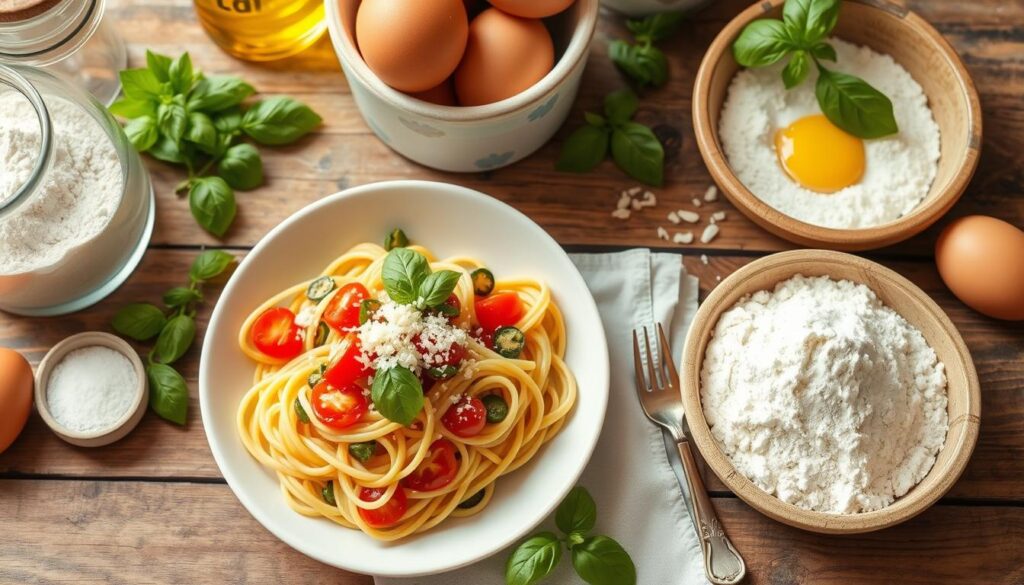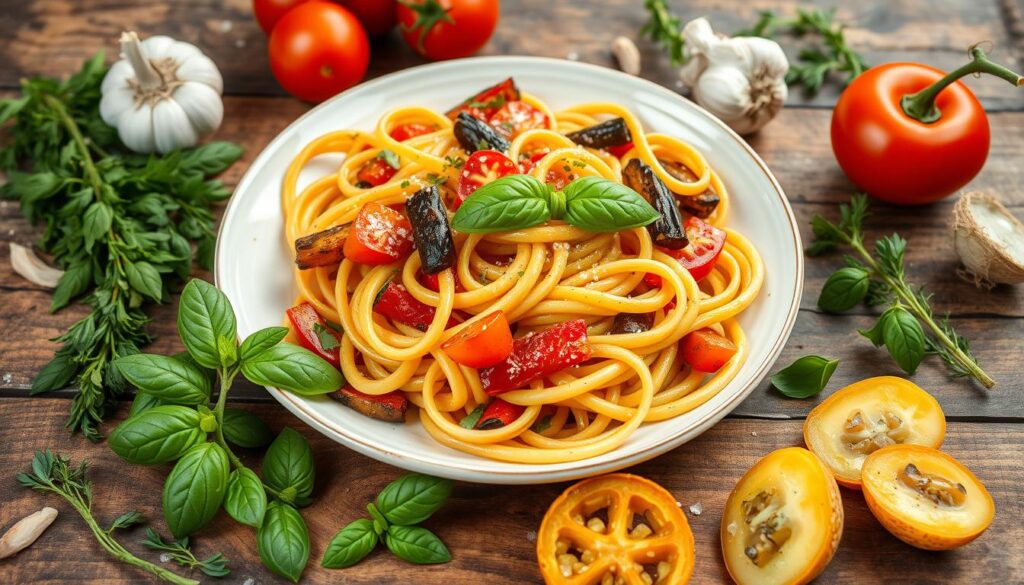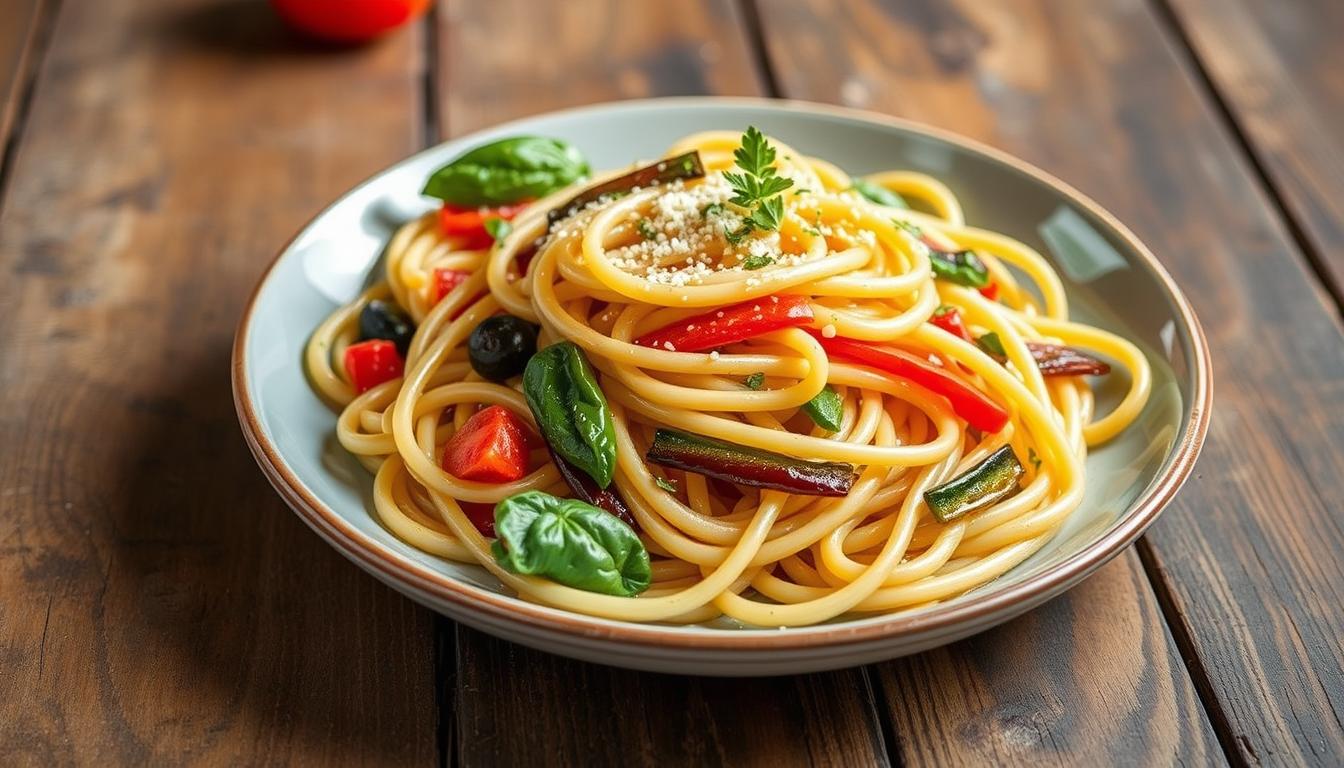Living with a gluten-free diet can be tough. Finding good pasta is a big challenge. But, this homemade gluten free pasta recipe changes everything. It’s easy to make and tastes just like regular pasta.
If you have celiac disease or just want to eat healthier, this recipe is for you. It’s simple to follow and makes a tasty pasta. You can use it in many dishes, like gluten-free baked ziti or spaghetti and meatballs.
Table of contents
- Why Make Homemade Gluten Free Pasta?
- What You Need for Gluten Free Pasta
- Making the Gluten Free Pasta Dough
- Rolling and Shaping the Pasta
- gluten free pasta recipe
- Cooking Fresh Gluten Free Pasta
- Tips for Perfect Homemade Pasta
- Storing and Freezing Gluten Free Pasta
- Flavoring and Enhancing Your Pasta
- Troubleshooting Common Issues
- Equipment Needed (or Not)
- Conclusion
- Source Links
Why Make Homemade Gluten Free Pasta?
Making your own gluten free pasta has many benefits. Fresh pasta tastes better and feels nicer in your mouth than store-bought. Plus, it’s cheaper to make a lot at home than to buy it.
For those who can’t eat gluten, homemade pasta is a healthier choice. It’s free from wheat, unlike many store-bought options.
The Benefits of Fresh Pasta
Homemade gluten free pasta is not just tasty. It’s also better for you. It’s softer and more enjoyable to eat. You can also pick what goes into it, avoiding bad stuff.
Cost Savings of Homemade Pasta
Homemade pasta saves you money. Ingredients like gluten free flour, eggs, and water cost less than store-bought pasta. So, you get great pasta without spending a lot.
“Homemade gluten free pasta is not only delicious, but it also offers a range of advantages over store-bought options.”
What You Need for Gluten Free Pasta
Making gluten-free pasta at home starts with the right flour blend. Better Batter and Cup4Cup are top choices. They mix finely ground rice flour with starches for a dough that’s smooth and pliable. Home cooks and chefs love them for making pasta that feels just like the real thing.
Best Gluten Free Flour Blends
Want to mix your own gluten-free flour? There are many guides online to help. Look for a mix with rice, tapioca, and potato starch. These grains help your pasta feel like it’s made from wheat. Play with different mixes to find the one that works best for you.
| Flour Blend | Ingredients | Customer Rating | Recommended For |
|---|---|---|---|
| Better Batter | Rice flour, potato starch, tapioca starch, xanthan gum | 4.8/5 stars | All-purpose, pasta, baking |
| Cup4Cup | Rice flour, tapioca flour, potato starch, milk powder, xanthan gum | 4.6/5 stars | Pasta, pizza, cookies |
With the right flour blend, you’re ready to make gluten-free pasta that’s just as good as the real thing. Keep an eye out for the next steps in making your pasta!
Making the Gluten Free Pasta Dough
Making gluten-free pasta at home is simpler than you might think. You can use a food processor or mix by hand. The secret to great pasta dough is the right mix of flours and binders. Let’s look at both methods to get the perfect texture for your homemade pasta.
Using a Food Processor
The food processor makes mixing dry and wet ingredients easy. Start with gluten-free flour blend, like arrowroot starch and tapioca flour. Add binding agents like whey protein powder and guar gum. Pulse until everything is well mixed.
Then, add olive oil, eggs, and water. Pulse until the dough starts to form. Be careful not to overdo it. If it’s too dry, add water slowly until it’s just right.
Mixing by Hand
Mixing by hand is a great option if you like getting your hands dirty. Make a well in the dry ingredients and add wet items like olive oil and water. Use your fingers to mix and knead until it’s smooth and elastic. Add water as needed to get the right feel.
Whether you use a food processor or mix by hand, aim for a dough that’s well mixed and smooth. This will make your homemade gluten-free pasta cook perfectly every time.
Rolling and Shaping the Pasta
After making your gluten free pasta dough, it’s time to shape it. You can use a pasta machine or roll it by hand. This will help you get the right thickness.
Using a Pasta Machine
Start with the widest setting on your pasta machine. Then, lower the thickness a bit at a time. Roll it twice at each setting until it’s about 1/8-inch thick.
Rolling by Hand
For a hands-on method, use a rolling pin. Roll out the gluten-free pasta dough as thin as you can. Aim for 1/8-inch thickness. Be patient and don’t let it tear.
After reaching the right thickness, cut the pasta into shapes like noodles or ravioli. Let it dry a bit before cooking. This helps it keep its shape.
Working with gluten-free pasta takes practice. But the joy of making your own is worth it. Enjoy the process and feel proud of your homemade pasta.
gluten free pasta recipe
Craving a hearty, flavorful pasta dish but on a gluten-free diet? This gluten free pasta recipe is for you. It lets you make delicious homemade pasta in your kitchen. It’s perfect for those with celiac disease or anyone looking for healthy alternatives to regular pasta.
The recipe uses a mix of arrowroot starch, tapioca flour, sweet rice flour, and millet flour. It also includes whey protein powder or non-fat dry milk powder for extra structure. You’ll need 3 large eggs and a bit of water to make the dough.
After making the dough, you can use a pasta machine to make long, beautiful strands. Or, roll it out by hand for sheets to make gluten-free ravioli. The pasta cooks in 1 1/2 to 2 minutes. Serve it with your favorite sauce for a tasty, wheat-free meal.
This gluten free pasta recipe lets you make homemade, healthy alternatives to traditional pasta whenever you want. Enjoy a steaming bowl of fresh, gluten-free pasta without losing flavor or texture.
Cooking Fresh Gluten Free Pasta
Making gluten free pasta is simple and fast. Just boil a big pot of water, then add the gluten-free pasta. Cook for 2-3 minutes until it’s just right. Don’t overcook it, as gluten free pasta gets mushy quickly.
After cooking, toss the pasta with olive oil or your favorite sauce. Serve it right away for the best taste and texture.
This recipe makes 10-12 big ravioli or 20-24 small ones. Doubling it will feed a family of 4. It uses 3 cups of gfJules Flour, a healthy alternative to regular pasta. Homemade ravioli is cheaper than store-bought gluten-free ones.
Homemade ravioli cooks in just 3 minutes. You can fill it with fish, hummus, cheese, mashed potatoes, sweet potatoes, tapenade, or grilled veggies. You can also add an egg for extra flavor or spinach for color.
| Filling Options | Cooking Time | Nutritional Info |
|---|---|---|
| Pesto, hummus, tapenade, bruschetta, cheese, roasted peppers, sweet potatoes, mashed potatoes, roasted veggies | 3 minutes for fresh, 5-6 minutes for dried | 314 calories per serving, 26g carbs, 10g protein, 20g fat |
Freezing undercooked ravioli is a great way to save it for later. Just cook it for 2-3 minutes in boiling water again. Share your cooking stories and photos in the comments. Enjoy making and eating your own homemade gluten free pasta!

Tips for Perfect Homemade Pasta
Making homemade gluten-free pasta is rewarding but needs practice. To get it right every time, follow these tips. Check out this gluten free pasta recipe for inspiration.
Avoiding Sticky Dough
If your dough is too wet, add more gluten-free flour. The best flour for pasta has 10-13% protein. Letting the dough rest for 60 minutes at room temperature helps it become firmer and easier to work with.
Egg Substitutes for Vegan Pasta
Eggs are key for pasta texture, but you can use vegan alternatives. Flax eggs, chia eggs, aquafaba, or non-dairy yogurt work well to bind the flour. This makes the dough pliable and easy to roll.
Remember, cooking time is important to avoid gummy pasta. Dried pasta usually cooks in 8 to 15 minutes, depending on its thickness and type.
“The key to perfect homemade pasta, gluten-free or not, is patience and a little bit of experimentation.”
Storing and Freezing Gluten Free Pasta
Making homemade gluten free pasta is just the start. Keeping it fresh and tasty is all about how you store it. Whether you used quinoa, chickpeas, or lentils, here are some tips to keep your pasta delicious.
Fresh gluten-free pasta dough can stay in the fridge for up to 3 days. To freeze it, wrap it tightly in a freezer-safe bag. It can stay frozen for up to 3 months. Just thaw it before you roll and shape it.
Cooked gluten free pasta also freezes well for months. Mix it with oil or butter to stop it from sticking. Then, put it in an airtight container or bag. To reheat, just add it to boiling water or your favorite sauce.
Storing your pasta right is key to keeping it perfect. With a bit of planning, you can enjoy homemade gluten-free pasta anytime, even when you’re in a rush.
| Storage Method | Refrigerator | Freezer |
|---|---|---|
| Gluten-Free Pasta Dough | Up to 3 days | Up to 3 months |
| Cooked Gluten-Free Pasta | 3-5 days | Up to 3 months |
“Proper storage is the key to enjoying homemade gluten-free pasta anytime, whether it’s freshly made or frozen.”
Flavoring and Enhancing Your Pasta
Homemade gluten free pasta is a blank canvas for endless flavors. The recipe already has a bit of salt. But you can add herbs, spices, or mix-ins to make it even better. Try adding dried or fresh herbs like basil, oregano, or rosemary. You can also add garlic powder, onion powder, or lemon zest for a tangy taste.
Get creative and make your gluten free pasta your own. It’s all about what you like best.
Herbs and Spices for Flavor
- Fresh or dried basil
- Oregano
- Rosemary
- Garlic powder
- Onion powder
- Lemon zest
Remember, making your own gluten free pasta lets you control the taste. Don’t be shy to try new things. There are countless ways to make your pasta taste amazing.

“The great thing about homemade pasta is that you can make it exactly the way you like it. Don’t be afraid to experiment with different herbs and spices to find your perfect flavor profile.”
| Ingredient | Amount | Nutrition (per serving) |
|---|---|---|
| Gluten-free Spaghetti Sauce | 1 serving |
|
Troubleshooting Common Issues
If you run into problems with your homemade gluten free pasta, like it breaking or getting gummy, there are a few reasons why. Not kneading or hydrating enough can make the dough too brittle. Also, cooking it too long can make it mushy and fall apart. It’s important to cook it just right, usually for 2-3 minutes, to keep it al dente.
Why Pasta Breaks
Not kneading or hydrating enough can make the dough too brittle. This makes it prone to cracking when you roll it out. To fix this, knead the dough well and add enough liquid to get the right consistency. The dough should be smooth and elastic, not dry and crumbly.
Storage Life of Fresh Pasta
With the right storage, your fresh gluten free pasta can stay good for up to 3 days in the fridge. Keeping it properly stored is key to prevent it from drying out or getting brittle. Make sure to store it in an airtight container or wrap it tightly to keep its texture and flavor.
By tackling these common problems, you can enjoy delicious homemade gluten free pasta. It will be tender and easy to work with. With a bit of care and the right techniques, you can make a tasty pasta dish that’s great for a gluten-free diet or those with celiac disease.
Equipment Needed (or Not)
A pasta machine can help roll and shape gluten free pasta. But, you can also make it by hand with a rolling pin. The dough should be well worked and not too sticky.
Using a pasta machine or not, the result is fresh gluten free pasta that’s worth making. You’ll need a smooth surface, a rolling pin, a sharp knife, and about half an hour of time. Homemade pasta is much better than store-bought because of its soft texture.
To make pasta by hand, use 2 cups of flour to 3/4 cup of liquid. This makes 1 pound of pasta or 4 servings. Unbleached all-purpose flour with 10.5% protein is best for pasta dough. But, gluten-free flour hasn’t been tested in these recipes.
Whether you use a machine or not, you’ll get a fresh gluten free pasta that’s rewarding. With some practice and the right methods, you can make tasty homemade gluten-free pasta without special tools.
Conclusion
Making homemade gluten free pasta takes more time and effort than using dried pasta. But the taste and effort are worth it. This recipe lets you make fresh, tasty pasta at home, perfect for your favorite sauces and toppings.
It’s great for those on a gluten-free diet or looking for healthier options. Try different gluten-free pasta types like zucchini noodles or quinoa pasta. You might find your new favorite dish.
Try this recipe and enjoy homemade gluten-free pasta. It’s amazing with marinara sauce or new flavors. You’ll love the taste and texture of this fresh, healthy pasta.
FAQ
What are the benefits of making homemade gluten free pasta?
What type of gluten free flour is best for making pasta?
How do I make the gluten free pasta dough?
How do I roll and shape the gluten free pasta?
How do I cook fresh gluten free pasta?
How do I store and freeze gluten free pasta?
How can I customize the flavor of my homemade gluten free pasta?
What are some common issues with homemade gluten free pasta and how can I troubleshoot them?
Do I need a pasta machine to make homemade gluten free pasta?
Source Links
- https://glutenfreehomestead.com/category/recipe/dinner/pasta/ – Gluten Free Pasta Recipe Collection – Gluten Free Homestead
- https://meaningfuleats.com/gluten-free-italian-pasta-salad/ – EASY, Gluten-Free Italian Pasta Salad – Meaningful Eats
- https://heartbeetkitchen.com/homemade-gluten-free-pasta/ – Homemade Gluten-Free Pasta Dough • Heartbeet Kitchen
- https://plantifullybasedblog.com/2024/05/04/homemade-semolina-gluten-free-pasta-vegan/ – Homemade Vegan Semolina & Gluten Free Pasta – Plantifully Based
- https://www.mamaknowsglutenfree.com/homemade-gluten-free-pasta/ – Homemade Gluten-Free Pasta
- https://www.glutenfreepalate.com/homemade-gluten-free-pasta/ – Homemade Gluten Free Pasta (3 Ingredients)
- https://www.peelwithzeal.com/gluten-free-pasta-recipe/ – BEST EVER Gluten Free Pasta Recipe
- https://eatingglutenanddairyfree.com/easy-homemade-gluten-free-fettuccine-pasta/ – Easy Homemade Gluten Free Fettuccine Pasta Recipe
- https://rachlmansfield.com/one-pot-creamy-pasta-gluten-free/ – One Pot Creamy Pasta (gluten-free) – rachLmansfield
- https://gfjules.com/recipes/easy-gluten-free-ravioli-or-tortellini-recipe/ – Gluten Free Ravioli – quick & easy 3-ingredient recipe | gfJules
- https://www.mamaknowsglutenfree.com/almond-flour-pasta/ – Almond Flour Pasta
- https://www.jessicagavin.com/how-to-make-pasta-from-scratch/ – How to Make Pasta From Scratch
- https://cooking.nytimes.com/recipes/1018702-basic-fresh-pasta-dough – Basic Fresh Pasta Dough Recipe
- https://kaylacappiello.com/one-pan-gluten-free-pasta-bake/ – One Pan Gluten Free Pasta Bake
- https://pastatemple.com/how-to-freeze-fresh-pasta/ – How to Freeze Fresh Pasta (Avoid Freezer Burn)
- https://www.glutenproject.com/gluten-free-food/complete-guide-to-gluten-free-pasta – Complete Guide to Gluten-Free Pasta | Gluten-free food
- https://terianncarty.com/gluten-free-green-goddess-pesto-pasta/ – Gluten Free Green Goddess Pesto Pasta – Teri-Ann Carty
- https://georgeats.com/recipes/gluten-free-egg-pasta-without-xanthan-gum/ – Gluten free egg pasta without xanthan gum – George Eats
- https://www.mamaknowsglutenfree.com/gluten-free-spaghetti-sauce/ – Gluten-Free Spaghetti Sauce
- https://www.fatkitchen.com/keto-gluten-free-lupin-flour-pasta/ – Keto, Gluten-Free, Lupin Flour Pasta! With Many Shapes & Methods Included!
- https://gardenbetty.com/fresh-homemade-pasta-using-what-you-already-have-in-the-kitchen/ – Easy 4-Ingredient Colorful Homemade Pasta—No Pasta Maker Needed
- https://celiacselfcare.christinaheiser.com/p/kitchen-essentials-gluten-free-cooking – 8 Kitchen Essentials That Make Gluten-Free Cooking So Much Easier
- https://www.glutenfreegirl.com/gluten-free-fresh-pasta/ – How to Make Homemade Gluten Free Pasta? – Gluten Free Girl
- https://www.feedyoursoul2.com/vegan-and-gluten-free-spaghetti-carbonara/ – Vegan and Gluten-Free Spaghetti Carbonara – Feed Your Soul Too
- https://onlyglutenfreerecipes.com/blog/exploring-gluten-free-pasta-noodles-sauces-and-creative-recipe-ideas/ – Exploring Gluten Free Pasta: Noodles, Sauces, and Creative Recipe Ideas Only Gluten Free Recipes

